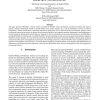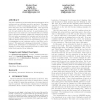401 search results - page 50 / 81 » Automatic Discovery of Linguistic Patterns for Information E... |
ICASSP
2009
IEEE
14 years 3 months ago
2009
IEEE
Providing punctuation in speech transcripts not only improves readability, but it also helps downstream text processing such as information extraction or machine translation. In t...
LREC
2010
13 years 10 months ago
2010
This paper presents Q-WordNet, a lexical resource consisting of WordNet senses automatically annotated by positive and negative polarity. Polarity classification amounts to decide...
TCBB
2010
13 years 7 months ago
2010
—Proteins and their interactions govern virtually all cellular processes, such as regulation, signaling, metabolism, and structure. Most experimental findings pertaining to such ...
COLING
2002
13 years 8 months ago
2002
While Named Entity extraction is useful in many natural language applications, the coarse categories that most NE extractors work with prove insufficient for complex applications ...
KDD
2007
ACM
14 years 9 months ago
2007
ACM
The web contains lots of interesting factual information about entities, such as celebrities, movies or products. This paper describes a robust bootstrapping approach to corrobora...


